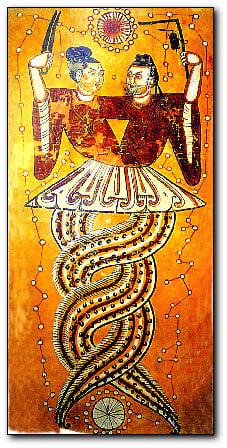I took up the study of I Ching after my dream Einstein met me at a Chinese gate some years ago and instructed me that the Chinese oracle is the best working model of the universe that is generally accessible. I proceeded to teach a series of classes titled I Ching for Dreamers, invented some new exercises (though not the ones in last night’s dream) and compiled a personal work book on the hexagrams with notes on incidents that have followed specific readings. However, I have not been using the I Ching in recent months – except in my dreams.
A couple of years ago, during a previous pause in my study of I Ching, I received a visitation in the early hours on a snowy night in a motel in western New York. Here’s how I wrote up what seemed to be an encounter with a presiding spirit of the Chinese oracle:
Her face glows in the dark of my bedroom like a yellow moon. The lovely young Chinese woman is studying me intently. She is as near as the foot of my bed. Her eyes are both very dark and very bright, her hair is lustrous black, cut neatly at shoulder length to produce a helmet effect. She is wearing a yellow tunic dress, and I remember that in China yellow is the color of Earth.
=
She communicates her intention: to teach me the real I Ching. As I look in her eyes I see they are like 8-balls, in constant rhythmic motion, displaying the eight trigrams that compose the essence of the Book of Changes, marrying in pairs to make the 64 hexagrams.
If this is a Lady of Earth, of the receptive power of K’un, where is her consort? I see him now, wearing a robe of deep blue silk, embroidered with what may be bronze dragons. He is a Lord of Sky, and I know he personifies Ch’ien, the Heaven of the Changes. His lower body moves, indistinctly, like that of a great serpent-dragon, its coils turning like a mobius strip. I sense that his lower body interweaves with that of the Lady.
–
I recall that according to tradition, the trigrams were invented by the dragon emperor Fu Xi, drawing knowledge from Heaven, and that in certain Taoist temples Fu Xi and his consort Nuwa are depicted together. Their upper bodies are human; their lower bodies are those of serpent-dragons, intertwined. Awed by the energy presence of these ancient beings in my space, I am also embarrassed by my faulty memory of the Changes. I try to rehearse the names and forms of the eight trigrams in my mind. The primal pair: Heaven and Earth, Ch’ien and K’un. Fire and Water, Li and Kan. Lake and Mountain, Tui and Ken. Wind and Thunder, Sun and Chen. Do I have that right?
Not that way. The code of Thunder flares in the Lady’s changing eyes. Her fierce intent interrupts my effort to recite the list of the trigrams. Like this. Her eyes change again. I see a green mountain rising in a soft mist. There is a gentle lake at its summit, and around the peak a perfect cloud ring. Lake on the Mountain. I struggle to remember the name and the attributions of the corresponding hexagram. Something to do with lovers, newlyweds, attraction.
Not like that. She is opening a different way of seeing and reading the code of the Changes. I relax into the embrace of Earth, and soon find myself in a different scene.
I am on top of a very tall and steep hill, with warriors dressed in skins and armed with bows and spears. There is an intense feeling of being alive up here. The wind is fresh and brisk, lifting my hair, fluttering a loose fringe. We may have a battle to fight, but our spirits are high, our defensive position is very strong, and we can see whatever is coming at us from far away. This hill fort has a commanding view. I can see across great vistas in all directions.
Access to our hill fort is via a wooden ladder that goes up the hillside for hundreds of feet. It can be pulled up to deny access to strangers. My lieutenant is so agile I doubt that he needs a ladder. Laughing, he sways his body over the edge of the drop until his back is almost horizontal. This defies human physiology. Maybe he has feet that can grip like fists. Respecting my human limitations, I take a step back from the brink, then smile at myself because the body I am using here can do things the body I left in bed can’t manage.
–
Remembering that my regular body is in a bed in a snowy northern town, I recollect my encounter with the Lady who told me she would teach me the real I Ching. Am I inside one of the hexagrams? If so, which one? My guess would be the 20th hexagram, which is called Guan, or Watching. Wind over the Earth.
–
The wind blows over the earth.
This is the image of Watching.
In this way ancient kings
looked across the four drections
observed the people
and gave them instruction.
–
I hang over the precipice, studying the ladder. Despite its great height, it has only six rungs. Now I recall that ascending the Watchtower whose shape is concealed and revealed in the lines of the 20th hexagram is a journey of six steps. Few can manage these six steps in the cours
e of a lifetime. On the first step, we see as an un-wise child; we notice only what relates to our cravings and fears. On the second step. we see like a nervous homebody peering out through a slit in a wall; protected by structure, we see little beyond it. On the third step, we look in a mirror and begin to observe ourselves, and what we have done and not done on our life journeys. On the fouth step, like lookouts, we can see across the land and provide news and warnings for our communities. On the fifth step, we return to self-observation, looking harder and deeper at our true slves. If we make it to the sixth and final step, we can see the whole. We can look at ourselves from a witness perspective. We no longer look from the ego, but from the greater Self.
–
Again, I see the changing eyes, with the turning codes, and sense the movement of the dragon coils in their mobius dance. I have read thirty books on I Ching, and made my own guide to the hexagrams, giving personal names to each one and noting incidents that followed a particular reading on a certain date. I once taught a course titled “I Ching for Dreamers” in which we drummed the patterns of broken and unbroken lines, inspired by the most ancient, fragmentary text of the Book of Changes, found in a lacquer hamper in the tomb of a lord at Mawangdui as recently as 1973, where it is written that “the sages drummed the movements of all under Heaven” into the oracle. [1]
However, I consider myself a rank amateur in this area, and would not trust my ability to read the Changes until I have internalized the 64 hexagrams and the changing lines without the need to look anything up. In Chinese tradition such mastery requires either a lifetime of training, memorizing and practice, or the direct inspiration of past masters, or both.
–
The shining eyes give me Heaven under Earth, the desirable placement since this means the primal pair are coming together. Maybe I can aspire to know a little more of the Changes in the years that remain to me. Maybe, with the Yellow Lady and the Blue Lord as gatekeepers, I will lead others on a journey through the cycles, to climb the ladder of six steps to the Watchtower.
–
[1] Edward L. Shaughnessy, I Ching, The Classic of Changes: The First English Translation of the Newly Discovered Second-Century B.C. Mawangdui Texts (New York: Ballantine, 1997) 203.
Graphic: A prime candidate for Lady of the I Ching: Nuwa and Fu Xi, legendary inventor of the trigrams
 Oracles have their own life, and can call you even when you are not calling on them. Last night my dream self was test-flying some new games involving the I Ching, the ancient Chinese oracle. These involved identifying a “life hexagram” based on the numerology of your birth date, and locating a hexagram for the day – or for any selected future date – by a similar method. I will now experiment with the games my dream self devised and see how they work.
Oracles have their own life, and can call you even when you are not calling on them. Last night my dream self was test-flying some new games involving the I Ching, the ancient Chinese oracle. These involved identifying a “life hexagram” based on the numerology of your birth date, and locating a hexagram for the day – or for any selected future date – by a similar method. I will now experiment with the games my dream self devised and see how they work.
